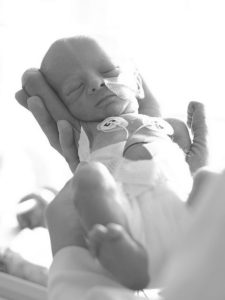A recent NPR health segment discussed many of the benefits of a popular form of newborn care called kangaroo care. Kangaroo care is when newborn babies are placed on their mother’s or father’s bare chest instead of in a bassinet or other form of crib. Physician and researcher Nils Bergman explains the benefits of kangaroo care, or as many call it, skin-to-skin contact. “The mother’s body is the baby’s natural habitat, the place where development happens,” he says. The placement of the baby on the mother right after birth provides a safe place for baby to be welcomed into the world and begin to develop and make necessary progresses.
Benefits of Kangaroo Care
Research has been done on the benefits of skin-to-skin contact over the past few decades as it became more common in hospitals in the United States. Studies have found that skin-to-skin contact:
- Helps prevent the baby’s blood sugar from getting too low
- Stabilizes premature babies more quickly than an incubator
- Helps increase milk production in mothers
- Encourages breastfeeding and helps babies latch and feed more effectively
- Reduces the amount babies cry
- Helps premature babies gain weight better
- Maintains the baby’s temperature better than other methods
- Relieves pain or discomfort for babies experiencing tests or procedures
- Stabilizes a premature baby’s breathing and heart rate
- Promotes a strong bond between mothers and babies
Skin-to-skin facilitates the baby’s bond with parents
Initial studies were done on babies and their mothers, but many of these benefits can also be achieved through skin-to-skin contact with fathers or partners. Physical touch between parents and a new baby releases oxytocin – an important chemical released in the brain that helps build relationships.
Oxytocin creates a bond between the two that provides safety, contentment, and comfort with one another. For this reason, each parent should provide skin-to-skin contact with the newborn. Especially in cases where the mother is in recovery or is separated from the baby for medical reasons, it may be encouraged that another person hold the newborn with skin-to-skin contact.
When might kangaroo care not be permitted?
Kangaroo care may not always be permitted, especially if your baby is being cared for in the NICU after birth. For this reason, it is best to request skin-to-skin contact with your baby and wait until medical professionals have given permission.
Disclaimer
This page is intended solely as an educational tool for parents. It is not intended as – and should not be mistaken for – medical advice.
About HIE Help Center
HIE Help Center is run by ABC Law Centers, a medical malpractice law firm exclusively handling cases involving hypoxic-ischemic encephalopathy (HIE) and other birth injuries since 1997.
If you suspect your child’s HIE may have been caused by medical negligence, contact us to learn more about pursuing a case. We provide free consultations, during which we will inform you of your legal options and answer any questions you have. No need to worry about the cost – you pay nothing throughout the entire legal process until we win your case.
You are also welcome to reach out to us with inquiries that are not related to malpractice. We cannot provide individualized medical advice, but we’re happy to track down informational resources for you.
Sources
- NPR: Kangaroo Care Helps Preemies and Full-Term Babies Too
- Today’s Parent: Skin to skin with Baby
- What to Expect: Men and Oxytocin, Creating an “Attachment” to Nurture Your Newborn Baby
- Cochrane Review: Early Skin-to-Skin contact for Mothers and their Healthy Newborn Infants
- American Academy of Pediatrics: Skin-to-Skin Care for Term and Preterm Infants in the Neonatal ICU
- The Effects of Kangaroo Care in the Neonatal Intensive Care Unit on the Physiological Functions of Preterm Infants, Maternal–Infant Attachment, and Maternal Stress
- Promoting Neuroprotective Care in Neonatal Intensive Care Units and Preterm Infant Development: Insights From the Neonatal Adequate Care for Quality of Life Study
- Kangaroo Care for the Preterm Infant and Family

Leave a Reply
You must be logged in to post a comment.